The Poetry and History of Patrizia Pinzon’s Casco Viejo
Patritzia Pinzon lives in the fabled city of Casco Viejo, the oldest quarter of Panama, where formerly neglected buildings are restored to their historic grandeur, and where Patrizia's active participation has helped to infuse the community with vibrancy and modernity, qualities reflected in Patrizia’s personal outlook. Jet finally gets to meet her favorite House Hunter’s International star, whose blog she regularly reads and enjoys. And we learn about Patrizia’s family ties to Casco Viejo and her abiding love for the town that she fosters and adores.
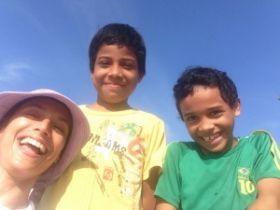
Jet Metier: I have so wanted to talk to you, ever since I saw you on House Hunters International.
Patrizia Pinzon: Oh, no way. Is that episode is still playing?
(Patrizia Pinzon with Casco Viejo children, pictured at right.)
Jet Metier: I think I saw it five years ago and I was struck by your presence. There you were: I remember you were wearing pants, had no purse, and you were striding along Casco Viejo like you owned the world. You were leading those two gentlemen in the episode. You were your own parade.
Patrizia Pinzon: Speaking of that, I had the same experience today. Casco Viejo is so small that you feel that the whole neighborhood is your backyard and it just happens to have a bunch of people in it. It’s that kind of feeling.
Jet Metier: When you walk along the street, how many “hello’s” do you come upon, let’s say, within an hour?
Patrizia Pinzon: Right now, I’m sitting outside of Casco Bikes (pictured below) on 12th and Avenue A, just after having had a juice, and there’s been at least five or six times that kids have by to say “Hi”. That’s how the neighborhood is; you just bump into everybody.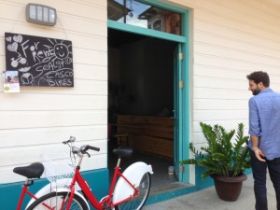
Jet Metier: Let’s get an update from that House Hunter’s International episode. What happened to the guys who wanted to open a bar in Casco?

Jet Metier: Let’s get an update from that House Hunter’s International episode. What happened to the guys who wanted to open a bar in Casco?
Patrizia Pinzon: Eric opened his bar and called it Mojitos. It’s next to Plaza Herrera, on the corner of 9th and A. Eric’s been in the States for a year now, so he has somebody else unning it, but I hear that he’s almost getting ready to come back.
Jet Metier: What kind of crowd goes there?
Patrizia Pinzon: Young people, including young Panamanians; everybody goes there. It’s a classic guys’ bar; it’s a rock and roll, beer and hamburger place. But oddly, given the name they gave it, they will not serve you mojitos.
Jet Metier: Is Eric the one who came originally, or was he the friend who brought the other one in the episode the conditioner?
Patrizia Pinzon: Actually, his friend was the one who brought the conditioner. Vladimir was the one I met at first. Vladimir made some investments here and there, and eventually he came to Casco and liked it. It was Vladimir who brought Eric, but Eric was the one who ended up living in Panama, because Vladimir still had his business in New York.
Jet Metier: Oh, I see. As I remember, you also showed them an apartment. What plaza did it overlook?
Patrizia Pinzon: Plaza Herrera; the same plaza where he now has his bar.
Jet Metier: What kind of crowd goes there?
Patrizia Pinzon: Young people, including young Panamanians; everybody goes there. It’s a classic guys’ bar; it’s a rock and roll, beer and hamburger place. But oddly, given the name they gave it, they will not serve you mojitos.
Jet Metier: Is Eric the one who came originally, or was he the friend who brought the other one in the episode the conditioner?
Patrizia Pinzon: Actually, his friend was the one who brought the conditioner. Vladimir was the one I met at first. Vladimir made some investments here and there, and eventually he came to Casco and liked it. It was Vladimir who brought Eric, but Eric was the one who ended up living in Panama, because Vladimir still had his business in New York.
Jet Metier: Oh, I see. As I remember, you also showed them an apartment. What plaza did it overlook?
Patrizia Pinzon: Plaza Herrera; the same plaza where he now has his bar.
(Plaza Herrera at sunset, pictured below.)
Jet Metier: Have you been back to see the apartment? Have they done any improvements?.jpg)
Patrizia Pinzon: Eric had lived in that apartment for three or four years, and now he has it rented. He’s got a story about each room.
Jet Metier: Have you been back to see the apartment? Have they done any improvements?
.jpg)
Patrizia Pinzon: Eric had lived in that apartment for three or four years, and now he has it rented. He’s got a story about each room.
Jet Metier: Let me ask you about the filming. It presents an image of you walking down Casco just like in the '70s, when there was a television series called “Mary Tyler Moore.” She was leaving a small town to come to the big city, and there’s an iconic moment where she’s in the middle of the traffic and she throws her hat in the air.
Patrizia Pinzon: Oh my God.
Jet Metier: So when I saw you walking down Casco, I just said, “Look at that woman. It's just like the TV show. She has it all together.” Where were you in your life then? Were you married at that point? You just seemed so happy and just so together.
Patrizia Pinzon: Oh my God, that is so funny. This is the first time I’ve ever heard that.
Jet Metier: Really? Haven’t people noticed? Oh my goodness, Patrizia.
Patrizia Pinzon: No, no, no. Of course, I mean, I’ve been a happy person all my life. At that point, I was already married. We don’t have kids. And now we have a lovely dog . (Patrizia with her dog, Chispa, pictured below.)
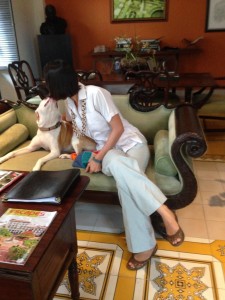
Jet Metier: Was there something happening in the business or something like that? I’m trying to get the secret of the Mona Lisa smile that you have.
Patrizia Pinzon: It’s called “Not Living in New York.” It’s called “Living in Panama.”
I actually never lived abroad. I’m just joking. It’s just that everybody that I meet from New York seems to be saying, “Oh my God, I need to get out of this stress.”
Jet Metier: So if I were to say your name to others in Panama, would people say, “Oh, that family. I know them.” Is your name a recognizable name in Panama?
Patrizia Pinzon: Yes, definitely in Panama. My last name, Pinzon, is still very recognizable because this is a small country. The Pinzons come mostly from two towns. Some people would know one or both of those towns. And, if you say my name and you say "Casco Viejo," even in Panama City, people will know my immediate family, which is associated with Casco, too.
Jet Metier: What two towns are you referring to?
Patrizia Pinzon: My Pinzon side is from the countryside of Panama, in an area called Ocu, which is a very dry area. Because it was so dry, the Spanish settled there in the colonial area, so it’s very influenced by Spanish. Even now if you go to Ocu, you will see the cradle of Panamanian culture. The more recognizable folkloric traditions, the dresses, and other things come from that area.
Jet Metier: What are the other larger towns in that area that we would know?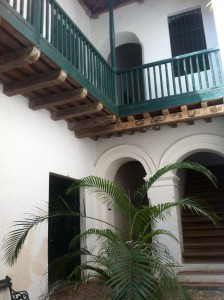
Patrizia Pinzon: You have Las Tablas. You would see Herrera. All those are the provinces. Ocu is within Herrera. When people talk about Panamanian carnivals, they always talk about Las Tablas for the big show, Penonome for the water carnival, and Ocu for the most traditional carnival. Ocu is thought of as the most mellow, but most traditional carnival. Ocu is the town where the old traditions are still kept.
Jet Metier: So if I were to say your name to others in Panama, would people say, “Oh, that family. I know them.” Is your name a recognizable name in Panama?
Patrizia Pinzon: Yes, definitely in Panama. My last name, Pinzon, is still very recognizable because this is a small country. The Pinzons come mostly from two towns. Some people would know one or both of those towns. And, if you say my name and you say "Casco Viejo," even in Panama City, people will know my immediate family, which is associated with Casco, too.
Jet Metier: What two towns are you referring to?
Patrizia Pinzon: My Pinzon side is from the countryside of Panama, in an area called Ocu, which is a very dry area. Because it was so dry, the Spanish settled there in the colonial area, so it’s very influenced by Spanish. Even now if you go to Ocu, you will see the cradle of Panamanian culture. The more recognizable folkloric traditions, the dresses, and other things come from that area.
Jet Metier: What are the other larger towns in that area that we would know?

Patrizia Pinzon: You have Las Tablas. You would see Herrera. All those are the provinces. Ocu is within Herrera. When people talk about Panamanian carnivals, they always talk about Las Tablas for the big show, Penonome for the water carnival, and Ocu for the most traditional carnival. Ocu is thought of as the most mellow, but most traditional carnival. Ocu is the town where the old traditions are still kept.
(Spanish style Casa Gongora, Casco Viejo, pictured right.)
Jet Metier: What are the old traditions that they keep?
Jet Metier: What are the old traditions that they keep?
Patrizia Pinzon: For carnivals specifically, they have something that nobody else has. You have queens during carnivals, right? Usually Las Tablas will have an upper side of the street queen and a lower side of the street queen, which is called calle arriba and calle bajo. Ocu also has a middle queen, who represents calle en centro, so Ocu has three queens.
One of the traditions in Ocu is you can go from house to house because people will cook for you. And carnivals are a big thing because everybody cooks and everybody is supposed to be a host, so for carnival, they cook, and they give you drinks. You go with your little glass and they give you drinks. Pretty much you can walk into any house. You will see them on the porches outside. They also have dancers.
Jet Metier: Is this the town, Patrizia, that you grew up in?
Patrizia Pinzon: That’s actually my father’s town. I grew up in the city.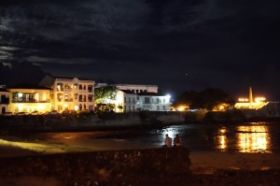 (The shore at Casco Viejo at night, pictured below.)
(The shore at Casco Viejo at night, pictured below.)
Jet Metier: Did you go to your father’s town when you were a teenager, too?
Patrizia Pinzon: I went when I was young. The thing is, all of my father’s cousins moved to Panama City, and they actually grew up together in Panama City. So my own cousins, their sons and daughters, we’re more of a Panama City crowd. And the way we celebrate our big birthdays is with a traditional dance, and everybody goes with the folkloric dress, including me, which is hysterical.
Jet Metier: Is this in each other’s homes or do you rent a hall?
Patrizia Pinzon: At this point the celebration has gotten so big, that they have ended up renting halls.
Jet Metier: How many family members are there?
Jet Metier: Is this the town, Patrizia, that you grew up in?
Patrizia Pinzon: That’s actually my father’s town. I grew up in the city.
 (The shore at Casco Viejo at night, pictured below.)
(The shore at Casco Viejo at night, pictured below.)Jet Metier: Did you go to your father’s town when you were a teenager, too?
Patrizia Pinzon: I went when I was young. The thing is, all of my father’s cousins moved to Panama City, and they actually grew up together in Panama City. So my own cousins, their sons and daughters, we’re more of a Panama City crowd. And the way we celebrate our big birthdays is with a traditional dance, and everybody goes with the folkloric dress, including me, which is hysterical.
Jet Metier: Is this in each other’s homes or do you rent a hall?
Patrizia Pinzon: At this point the celebration has gotten so big, that they have ended up renting halls.
Jet Metier: How many family members are there?
(Patrizia's family gathering pictured below.)
Patrizia Pinzon: Ah well, what can I say? It’s Latin America. The numbers keep growing. My husband’s mother wants to have everybody wear nametags. I think I’m starting to understand that. I think I’m going to just put tags on my nephews and say, “Okay kid, I really don’t remember your name. Please wear this.”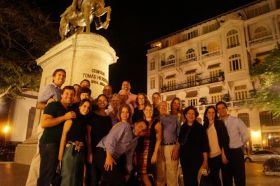
Jet Metier: So you spoke about your dress. Please describe the traditional dress that you would wear.
Patrizia Pinzon: In Panama, there are several traditional dresses, but the one that is largely known is called the pollera. Every town in the countryside has its own pollera. Las Tablas, for example, is very famous because it has the most luxurious one. Ocu, on the other side, is the peasant’s pollera. It’s a very simple, yet very elegant peasant’s pollera and you wear it with a hat. I can send you photos of me in the pollera.
Jet Metier: I would like to see that. Yes.
Patrizia Pinzon: When I was asked to wear the dress, I said, “Oh my God, I haven’t done this in years.”
Patrizia Pinzon: Ah well, what can I say? It’s Latin America. The numbers keep growing. My husband’s mother wants to have everybody wear nametags. I think I’m starting to understand that. I think I’m going to just put tags on my nephews and say, “Okay kid, I really don’t remember your name. Please wear this.”

Jet Metier: So you spoke about your dress. Please describe the traditional dress that you would wear.
Patrizia Pinzon: In Panama, there are several traditional dresses, but the one that is largely known is called the pollera. Every town in the countryside has its own pollera. Las Tablas, for example, is very famous because it has the most luxurious one. Ocu, on the other side, is the peasant’s pollera. It’s a very simple, yet very elegant peasant’s pollera and you wear it with a hat. I can send you photos of me in the pollera.
Jet Metier: I would like to see that. Yes.
Patrizia Pinzon: When I was asked to wear the dress, I said, “Oh my God, I haven’t done this in years.”
My dad simply said, “You’re going to wear one.”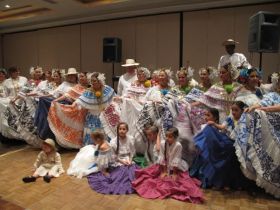

So I said, “Okay.”
Jet Metier: And the hat, too.
Patrizia Pinzon: And the hat, too. There are two forms to wear it. One is with the hat and the other one is just with a lace, a lace that goes around your head, like a very simple tie and a bow (pictured at right). It’s very countryside, very pleasant, very simple and very nice. I like it.
Jet Metier: And the hat, too.
Patrizia Pinzon: And the hat, too. There are two forms to wear it. One is with the hat and the other one is just with a lace, a lace that goes around your head, like a very simple tie and a bow (pictured at right). It’s very countryside, very pleasant, very simple and very nice. I like it.
Jet Metier: Did you make it?
Patrizia Pinzon: No, making a pollera is a huge amount of work. A well-made pollera can be as expensive as $5,000. The one that I’m wearing in the photo is from my mom.
Jet Metier: What do you mean? It used to be your mother’s?
Patrizia Pinzon: Yes. Polleras here are getting inherited. You can buy them, but they’re expensive.
Jet Metier: So your father is from Ocu. Where is your mom from?
Patrizia Pinzon: She is from the south of Italy.
Jet Metier: No way? Really?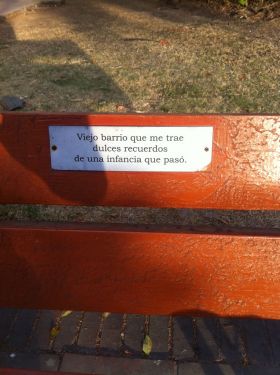
Patrizia Pinzon: No, making a pollera is a huge amount of work. A well-made pollera can be as expensive as $5,000. The one that I’m wearing in the photo is from my mom.
Jet Metier: What do you mean? It used to be your mother’s?
Patrizia Pinzon: Yes. Polleras here are getting inherited. You can buy them, but they’re expensive.
Jet Metier: So your father is from Ocu. Where is your mom from?
Patrizia Pinzon: She is from the south of Italy.
Jet Metier: No way? Really?

(A bench with the inscription "Old neighborhood that brings back sweet memories," pictured at right.)
Patrizia Pinzon: Panama is really just like that, right? Everybody is mixed.
Jet Metier: Is “Patrizia” the Spanish spelling or the Italian spelling?
Patrizia Pinzon: It’s the Italian spelling. It would be pronounced Pa-trit-si-ya.
Jet Metier: And how do they pronounce it in Panama?
Patrizia Pinzon: Pa-tri-si-ya.
Jet Metier: Okay. So when you hear your name pronounced the Italian way, do you think you’re in trouble, because it’s the way your mom pronounces your name?
Patrizia Pinzon: You know, you nailed it. And especially, if I heard her say my complete name, which is Patrizia Alessandra, I knew I was in deep trouble.
Jet Metier: Tell me more about your mother and the Italian community. Is she first generation Italian?
Patrizia Pinzon: No, no. She was from Italy. I am half Italian. My dad met her in Italy while studying in Bologna, Italy, back in the '60s. They got married and they came to Panama.
Jet Metier: What was your dad doing in Bologna, Italy?
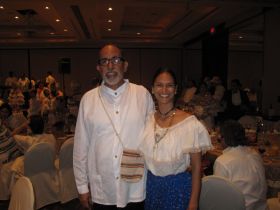 (Patrizia pictured at right with her father )
(Patrizia pictured at right with her father )Patrizia Pinzon: He was studying for his career in engineering.
Jet Metier: And he had to learn Italian in order to study engineering in Bologna?
Patrizia Pinzon: Yes. Back then, there was no alternative. As far as I understand, there weren’t that many foreigners in Bologna at that point. They stood out because the Panamanian group was very distinctive at the very local university. And Bologna is one of the oldest universities in Europe, especially for engineering.
They all married, and they all came back. Yes, they all got new blood.
Jet Metier: From that group, when your father went to study in Bologna, does he have any famous or notable Panamanian classmates who traveled with him during that time?
Patrizia Pinzon: Each one became something different and helpful. For example, Hospital Nacional is from one of those families. Dr. Juan Medrano founded the hospital and now that he has passed away, his wife is the one running it; the Italian wife, Ivana.
This was when Panama’s main industry was agriculture. They were producing products. We don’t produce that much anymore. We’re more service-oriented now.
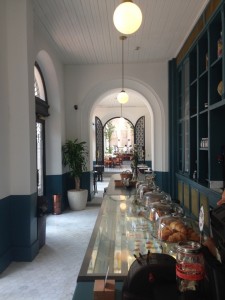
(Unidos in Casco Viejo for pastry and coffee, pictured at right.)
Jet Metier: What was happening politically or entrepreneurially in the '70s that you would have all these young Panamanians study abroad, then come back and bring their newfound abilities, skills and education back to Panama?
Patrizia Pinzon: There were different institutions offering scholarships, as well as the embassies. It was an interesting moment in time in the '60s.
Jet Metier: What was happening politically or entrepreneurially in the '70s that you would have all these young Panamanians study abroad, then come back and bring their newfound abilities, skills and education back to Panama?
Patrizia Pinzon: There were different institutions offering scholarships, as well as the embassies. It was an interesting moment in time in the '60s.
My dad came back in the ‘70s, but the ‘70s is when the dictatorship started, which ended later with Noriega’s withdrawal and the invasion in 1989, so my dad caught the whole thing from the beginning. I was born in ’76, so I spent most of my childhood wondering about what was going on, but not understanding it. My dad came back from Europe ready to work with all his friends, and this is what basically happened to the country, while he was in his most productive years.
Jet Metier: Oh my goodness. So what was that like for your father?
Patrizia Pinzon: He always kept a smile on his face. I think in a way that’s probably what I inherited from him.
Jet Metier: To persevere and to be optimistic?
Patrizia Pinzon: Yes, absolutely.
Jet Metier: And you say that there was an Italian community in Panama? Where are they centralized?.jpg)
.jpg)
(View from the balcony of American Trade Hotel, Casco Viejo at right.)
Patrizia Pinzon: They’re everywhere. The funny part is, now that I’m in Casco for the last ten years, we have a number of Italian investors. They are keen to these historic cities; they understand them and they find them interesting. So now we have a Little Italy here. I get to practice what little Italian I know with them and torture them with my bad pronunciation, and my even worse spelling.
Jet Metier: How many languages do you speak?
Patrizia Pinzon: Well, badly, a lot. I can conduct business in Italian. I can definitely order in a restaurant in French, and I can get around very, very basically in German, so it depends.
Jet Metier: So you said you grew up in Panama City. What neighborhood?
Patrizia Pinzon: Hato Pintado. It’s a weird name. The translation is even weirder. You know the cattle that have spots? That’s basically it. It’s “painted cattle.”
Jet Metier: Painted cattle? What’s the history behind that name for that part of town?
Patrizia Pinzon: It was named that way probably because it was a ranch. It was just farmland that eventually, as Panama City grew, started becoming part of the town.
Jet Metier: How many languages do you speak?
Patrizia Pinzon: Well, badly, a lot. I can conduct business in Italian. I can definitely order in a restaurant in French, and I can get around very, very basically in German, so it depends.
Jet Metier: So you said you grew up in Panama City. What neighborhood?
Patrizia Pinzon: Hato Pintado. It’s a weird name. The translation is even weirder. You know the cattle that have spots? That’s basically it. It’s “painted cattle.”
Jet Metier: Painted cattle? What’s the history behind that name for that part of town?
Patrizia Pinzon: It was named that way probably because it was a ranch. It was just farmland that eventually, as Panama City grew, started becoming part of the town.
Jet Metier: Please tell us about when you grew up in Hato Pinado.
Patrizia Pinzon: When I was little, I studied ballet, and then I danced with the National Ballet.
Jet Metier: Patrizia, that’s why you looked so beautiful when you were walking on House Hunter’s International. Your grace and elegance came from your training! Please let us know more about growing up in Panama and your connections to various places here.
Jet Metier: Patrizia, that’s why you looked so beautiful when you were walking on House Hunter’s International. Your grace and elegance came from your training! Please let us know more about growing up in Panama and your connections to various places here.
Patrizia Pinzon: I actually have two different connections to Casco Viejo. One was the family, because my dad was born and raised in Casco before leaving for Italy. So, as we would come for a Sunday stroll, we always heard family stories about the buildings we passed. The second connection was because I was dancing with the National Ballet and the headquarters are here because of the national theater, so I kept coming here since I was little. In a way, I’ve always felt that I grew up in both areas – Hato Pintado and Casco Viejo.
(The National Theater of Panama, pictured at right.)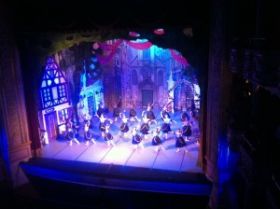
Jet Metier: When you lived in this spotted town area, what did it look like when you were a kid?
Patrizia Pinzon: Let’s call it “the Polka Dot Cow.”
Jet Metier: OK. When you lived in the Polka Dot Cow neighborhood, what was it like? And what’s it like now?
Patrizia Pinzon: It’s the classic suburb. It is exactly the same. Time has not changed it. There’s a little bit more development now. Some of the houses are being changed into small buildings.
Jet Metier: Were they single family homes with yards?
Patrizia Pinzon: Exactly.
Jet Metier: Did you go to public school or Catholic school?
Patrizia Pinzon: I went to a private school and eventually to Catholic school. I graduated from San Agustin School.
Jet Metier: What did you study in high school besides English and other languages? What was your favorite subject?
Patrizia Pinzon: My favorite subject? Literature.
Jet Metier: Did you want to write or are you a great reader?
Patrizia Pinzon: I like both. I can’t say that I have much to say when I write.
Jet Metier: Yes, you do. Your blog is wonderful, very detailed. I love when you were describing transporting your grandmother’s armoire (pictured below). That was very descriptive and very funny. That was very good.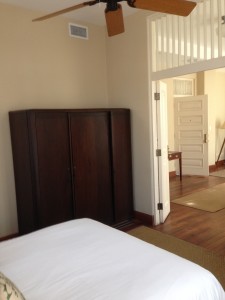
Patrizia Pinzon: That was exactly how it was. I do like writing. I used to write more when I was in school, but now, I guess, professionally, I try to do the blog. I enjoy that a lot and I do enjoy reading and poetry, when it’s well done.
Jet Metier: Yes, and in your blog you said that Spanish poetry is better if you “listen to it within.” What Spanish poets do you like to read and are there Panamanian poets that you can recommend?
Patrizia Pinzon: It’s strange; Panamanian poets are better at telling stories than in having us experience their poetry in written form. We’re not so much from a poetry tree as we are from a storytelling tree. We have amazing storytellers like the late Rogelio Sinán, who is still very popular here. Just the other day, I was invited to Diablo Rosso (pictured below), a creative art space and café, for a poetry jam.
Jet Metier: What is a poetry jam?

Jet Metier: When you lived in this spotted town area, what did it look like when you were a kid?
Patrizia Pinzon: Let’s call it “the Polka Dot Cow.”
Jet Metier: OK. When you lived in the Polka Dot Cow neighborhood, what was it like? And what’s it like now?
Patrizia Pinzon: It’s the classic suburb. It is exactly the same. Time has not changed it. There’s a little bit more development now. Some of the houses are being changed into small buildings.
Jet Metier: Were they single family homes with yards?
Patrizia Pinzon: Exactly.
Jet Metier: Did you go to public school or Catholic school?
Patrizia Pinzon: I went to a private school and eventually to Catholic school. I graduated from San Agustin School.
Jet Metier: What did you study in high school besides English and other languages? What was your favorite subject?
Patrizia Pinzon: My favorite subject? Literature.
Jet Metier: Did you want to write or are you a great reader?
Patrizia Pinzon: I like both. I can’t say that I have much to say when I write.
Jet Metier: Yes, you do. Your blog is wonderful, very detailed. I love when you were describing transporting your grandmother’s armoire (pictured below). That was very descriptive and very funny. That was very good.

Patrizia Pinzon: That was exactly how it was. I do like writing. I used to write more when I was in school, but now, I guess, professionally, I try to do the blog. I enjoy that a lot and I do enjoy reading and poetry, when it’s well done.
Jet Metier: Yes, and in your blog you said that Spanish poetry is better if you “listen to it within.” What Spanish poets do you like to read and are there Panamanian poets that you can recommend?
Patrizia Pinzon: It’s strange; Panamanian poets are better at telling stories than in having us experience their poetry in written form. We’re not so much from a poetry tree as we are from a storytelling tree. We have amazing storytellers like the late Rogelio Sinán, who is still very popular here. Just the other day, I was invited to Diablo Rosso (pictured below), a creative art space and café, for a poetry jam.
Jet Metier: What is a poetry jam?
Patrizia Pinzon: You go and they read aloud the poems or they act them. They perform the poems.
Jet Metier: Are they their own poems or are they reading other people’s poems?
Patrizia Pinzon: Usually their own. It can be with rhythm. It can be with music. It’s from the United States.
.jpg)
When I was invited there, I was fond of listening to Jaguar Clandestino. I think this guy is really talented.
Jet Metier: What was he like?
(A poetry jam at Diablo Rosso, Casco Viejo, pictured at right.)
Patrizia Pinzon: He’s such a mellow, just normal guy. And when you try to talk to him, he’s so amazingly shy and you think, “Oh my God. Is this guy really going to read something?”
And then not only is he going to read, he’s going to perform. Once he goes up, it is unbelievable. The things that come out of his mouth, the way that he moves his body, the whole situation, the rhythm. It is impossible to write it down, and I kept thinking afterwards, how can this guy make money with his art because he can’t write it down? It has to be live. It has to be performed; otherwise you don’t get it. But once you get it, it’s unbelievable. I had so much fun that night.
Jet Metier: Was he talking about his life? Was he telling a fictional story?
Patrizia Pinzon: It was basically his life, mixed with fiction, mixed with Panamanian day to day with politics, with normal street. He’s like a street poet.
Jet Metier: Was he talking about his life? Was he telling a fictional story?
Patrizia Pinzon: It was basically his life, mixed with fiction, mixed with Panamanian day to day with politics, with normal street. He’s like a street poet.
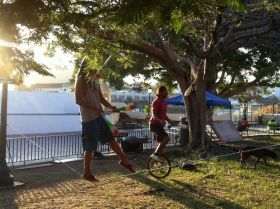 (Extreme fitness practitioners in Casco Viejo park, pictured at right.)
(Extreme fitness practitioners in Casco Viejo park, pictured at right.) Jet Metier: And you said that Panamanians were better storytellers. When you were a kid and you used to go to Casco Viejo for your weekly walk and you said that your dad would talk about the stories behind the buildings, what kind of stories would he tell?
Patrizia Pinzon: For example, he would tell stories about where they lived, where my grandmother met my grandfather.
Jet Metier: Tell that story, Patrizia. How did your grandparents meet each other?
Patrizia Pinzon: Well, there are several versions, so I don’t know if I’d get everything right. But eventually the fun part is that, after they were already married, they were both ended up working at what used to be the West Indian and Telegraph Company. My grandfather would run the mail department, which was huge, and my grandmother would run the telegraphy department. Nowadays, of course, we have the Internet, phones and Lord knows what else, but then when you wanted to communicate with the world, that was it, so I used to joke that, between my grandmother and grandfather, they controlled the communications of a whole country.
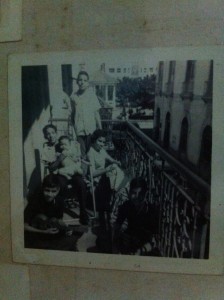 (Patrizia's father on family balcony in Casco Viejo with The Telegraphy in the background.)
(Patrizia's father on family balcony in Casco Viejo with The Telegraphy in the background.)Jet Metier: That’s powerful. And so, when you were a kid at Casco Viejo, what did it look like?
Patrizia Pinzon: For me, it looked pretty normal. Only now, in retrospect, can I recognize what a mess it was.
Jet Metier: By the way, that 17 minute video that you posted on your site that shows the buildings being constructed was really, really interesting.
Patrizia Pinzon: Yes and you know, it’s interesting how memory gets erased and rebuilt, which is an ability that we all have. You think that your memory’s going to be there and what you really remember is what it was, but its not. Even my father right now or his cousins would have a hard time describing what used to be there and exactly how it was because the image of the new buildings just modifies the memory of what used to be.
Jet Metier: You could be a poet. You’re speaking in poetry right now, Patrizia.
Patrizia Pinzon: It’s true. It’s just that we keep the facades of the buildings, but inside, they’re completely different. So the people who have been around for a while would have a hard time remembering. For example, the building that used to house the West Indian and Telegraph Company is now the Canal Museum (pictured below). When the Canal Museum opened, I took my grandmother there. She could not reorient herself. She did not know what was where. It erases everything and eventually all you remember is the new memory to the point where you think that it was always like that.
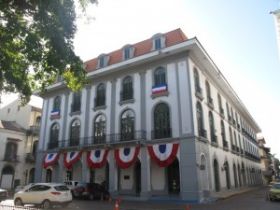
Rescuing history and keeping it alive, and finding where’s the middle point, is interesting to me.
Jet Metier: And for yourself too, as you look back, you said that you didn’t realize Casco Viejo was such a mess. What did you mean by “a mess” and why did you think that it was normal?
Patrizia Pinzon: It was normal because I hadn’t seen anything different.
Jet Metier: But you were living in Panama City, so you knew that Casco was considered a place that was down on its heels, you know? Neglected?
Patrizia Pinzon: No, because when you’re little and you just show up in the town of the your grandparents and your father, you see it with their eyes of love. It’s your neighborhood, you know. So there’s a lot of people who need help, there’s a lot of poor people, and there’s a lot of buildings that are halfway coming down. But you don’t see it. I never felt that the place was a dangerous place. I never felt that. Never.
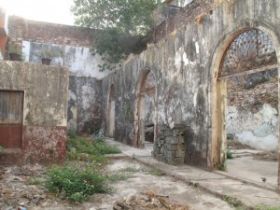
Jet Metier: Were you allowed to play in the streets when you used to go there? ( Casco Viejo ruin, pictured at right.)
Patrizia Pinzon: I guess when I came, I was always with the family and we were always going to the park and places like that, so everything was open space.
Jet Metier: And what about on the shore? Did you play there or was that considered…?
Patrizia Pinzon: That would be the one thing that my dad and everybody can tell you exactly how it used to be.
Jet Metier: How did it used to be?
Patrizia Pinzon: Dirty like crazy.
Jet Metier: Why was that?
.jpg)
Patrizia Pinzon: In the ‘50s, when my dad was a little kid, and in the ‘60s, when he was growing up, the bay was contaminated, but still people were using it a lot.
Jet Metier: What do you mean they were using it? For swimming?
Patrizia Pinzon: Surfing, swimming. Going to the beach was part of their daily lives. Going to the beach would mean just going to the little strip in Calle Tercera, and that was the beach. So there are plenty of memories of them surfing and doing things. But then as the city grew, the sewage system was not changed so it became more and more polluted. Only now, and I want to say this last 10, 15 years when the government of Panama invested in cleaning the bay, only now, you’re starting to see the fruits of that effort. So our beach is far cleaner. The turtles have come back; they nest there. So every year we have it documented. This year we even have photos of the turtles coming out. So there’s a little revival of the beach right now. My dad has told me, “This is unbelievable. I thought I would never see it.” And I’m like loving it. It’s fantastic.
Jet Metier: Patrizia, how do you get to the beach? (Current clean state of Casco Viejo beach, pictured above.)
Patrizia Pinzon: You just walk.
Jet Metier: But from what street or what building?
Patrizia Pinzon: You have different beaches. Right now, you have two beaches that are popular ones. The most popular one is on 3rd Street and A Avenue. You just walk down there. And that’s where you can access the surfing waves.
Jet Metier: And speaking of that, there was a woman who was a surfing champion who said that she learned to surf off Los Bolvedas.
Patrizia Pinzon: She did. Her name is Samanta Alonso (pictured below in her surf shop Los Bovedas.)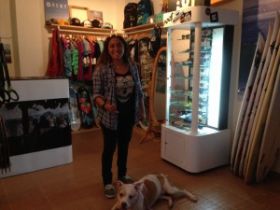
Jet Metier: Wait, we haven’t talked about this. It’s very funny. What are the surf breaks like? Are they one to three foot waves?
Patrizia Pinzon: They’re very mellow. It’s a fun wave. It’s enough to get you going and happy.
Jet Metier: What about her? Did she go down to Pedasi area to Venao?
Patrizia Pinzon: Yes, yes. She learned in all those areas. She’s a regular in all those areas. She just traveled to China to compete.
Jet Metier: What is this about Panamanian women and surfing? The other beautiful one from Pedasi? What is her name? Does she only have one name?
Patrizia Pinzon: We have Pucha Garcia. There are a number of them now.
Jet Metier: Have you met her?
Patrizia Pinzon: Yes, yes, yes. She’s probably the oldest one in the crowd now. The ones that I know are probably closer to Samantha’s age. You can see her on Facebook. Panamanians are all over Facebook. So if you look for Samantha Alonzo and you check her Facebook, you will see all of the photos of everybody and the competitions and everything.
Jet Metier: What at do you think it is about a little country like Panama that’s producing all these great women surfers? It’s really amazing.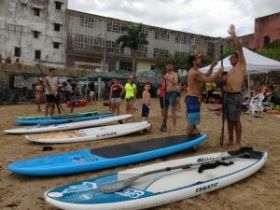 (Paddle boarding in Casco Viejo, pictured at right.)
(Paddle boarding in Casco Viejo, pictured at right.)
Patrizia Pinzon: I don’t know. My husband is a surfer and he always tells me how surfers in general are very protective of their wave, but I have never seen that in Panama. He always says that Panamanian surfers are so nice. So I guess that is the part of the niceness that we let girls play. I don’t know.
Jet Metier: Yes, because I grew up in the surf culture, too, but where it's very territorial and girls have to be able to withstand the guys being aggressive and possessive. So where did your husband learn to surf?
Patrizia Pinzon: In Miami.
Jet Metier: They have waves in Miami? Oh my goodness. Then again Kelly Slater is a surfer from Florida, too.
Patrizia Pinzon: Yes, he was just here.
Jet Metier: Kelly Slater?
Patrizia Pinzon: Yes, he was just in Bocas del Toro [on the Caribbean side of Panama]. There was a big swell and he flew down for it.
Jet Metier: Have you met him?
Patrizia Pinzon: No, no, no. That was in Bocas del Toro, so unfortunately we had work and my poor husband was dying. He was saying, “I cannot believe that I am working today.”
Jet Metier: So how did you meet your husband?
Patrizia Pinzon: We actually met in Bocas, where he used to live. That’s how he got to Panama to begin with, as a surfer. He was in Costa Rica and somebody told him, “Why don’t you go to Bocas del Toro?” And I was on vacation in Bocas del Toro, so that’s how we met.
Jet Metier: And how did you actually meet? Is it a good story? Were you paddling out yourself? Were you protecting the turtles’ eggs and saying, “Don’t surf here. I’m protecting the turtles eggs?” (Hatched turtles in the bay of Casco Viejo, pictured right.)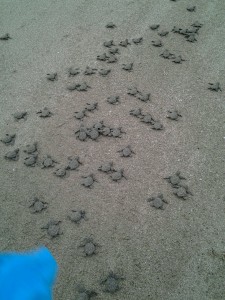
Patrizia Pinzon: No. I was working with the Smithsonian, and I decided I was going to go there, to the station.
Jet Metier: What were you doing for the Smithsonian?

Jet Metier: Wait, we haven’t talked about this. It’s very funny. What are the surf breaks like? Are they one to three foot waves?
Patrizia Pinzon: They’re very mellow. It’s a fun wave. It’s enough to get you going and happy.
Jet Metier: What about her? Did she go down to Pedasi area to Venao?
Patrizia Pinzon: Yes, yes. She learned in all those areas. She’s a regular in all those areas. She just traveled to China to compete.
Jet Metier: What is this about Panamanian women and surfing? The other beautiful one from Pedasi? What is her name? Does she only have one name?
Patrizia Pinzon: We have Pucha Garcia. There are a number of them now.
Jet Metier: Have you met her?
Patrizia Pinzon: Yes, yes, yes. She’s probably the oldest one in the crowd now. The ones that I know are probably closer to Samantha’s age. You can see her on Facebook. Panamanians are all over Facebook. So if you look for Samantha Alonzo and you check her Facebook, you will see all of the photos of everybody and the competitions and everything.
Jet Metier: What at do you think it is about a little country like Panama that’s producing all these great women surfers? It’s really amazing.
 (Paddle boarding in Casco Viejo, pictured at right.)
(Paddle boarding in Casco Viejo, pictured at right.)Patrizia Pinzon: I don’t know. My husband is a surfer and he always tells me how surfers in general are very protective of their wave, but I have never seen that in Panama. He always says that Panamanian surfers are so nice. So I guess that is the part of the niceness that we let girls play. I don’t know.
Jet Metier: Yes, because I grew up in the surf culture, too, but where it's very territorial and girls have to be able to withstand the guys being aggressive and possessive. So where did your husband learn to surf?
Patrizia Pinzon: In Miami.
Jet Metier: They have waves in Miami? Oh my goodness. Then again Kelly Slater is a surfer from Florida, too.
Patrizia Pinzon: Yes, he was just here.
Jet Metier: Kelly Slater?
Patrizia Pinzon: Yes, he was just in Bocas del Toro [on the Caribbean side of Panama]. There was a big swell and he flew down for it.
Jet Metier: Have you met him?
Patrizia Pinzon: No, no, no. That was in Bocas del Toro, so unfortunately we had work and my poor husband was dying. He was saying, “I cannot believe that I am working today.”
Jet Metier: So how did you meet your husband?
Patrizia Pinzon: We actually met in Bocas, where he used to live. That’s how he got to Panama to begin with, as a surfer. He was in Costa Rica and somebody told him, “Why don’t you go to Bocas del Toro?” And I was on vacation in Bocas del Toro, so that’s how we met.
Jet Metier: And how did you actually meet? Is it a good story? Were you paddling out yourself? Were you protecting the turtles’ eggs and saying, “Don’t surf here. I’m protecting the turtles eggs?” (Hatched turtles in the bay of Casco Viejo, pictured right.)

Patrizia Pinzon: No. I was working with the Smithsonian, and I decided I was going to go there, to the station.
Jet Metier: What were you doing for the Smithsonian?
Patrizia Pinzon: Well, there's a tropical research institute on Bocas del Toro, although, they have their headquarters in Panama City. I was doing more of their outreach programs. At that time, I was working for the Barro Coronado program [editor’s note: the largest island in the Panama Canal], so yes, that was what I was doing. I was there on vacation and I was looking for a hotel room because the island was packed. He had a youth hostel, so I went there, but he didn’t have space.
So I was said, “I’m here, I’m small, I fit anywhere.”
And he said, “I’m sorry.”
“Oh, okay. I’m just going to go somewhere else.” And I did.
Jet Metier: Did you really say, “I’m small. I fit anywhere.” That’s adorable.
Patrizia Pinzon: I did. He didn’t throw me out. It is in history now written forever..jpg)
Jet Metier: Did you really say, “I’m small. I fit anywhere.” That’s adorable.
Patrizia Pinzon: I did. He didn’t throw me out. It is in history now written forever.
.jpg)
Then, it was Patriots' Holidays, which is when in Panama there's four days where everybody just parties their heads off.
Jet Metier: What time of the year is Patriots' Holiday?
Patrizia Pinzon: November. Basically, the 1st to the 5th. Everybody kind of takes the whole week off, even though it’s not, strictly speaking, the whole week. On the 4th, I needed to come back. We happen both to be very fond of Indian food and the only restaurant in the whole country at that point that had Indian food was in Bocas. So while everybody was probably done at 6 in the morning, we were the only two people in town at a restaurant that had Indian food, so that’s where we reconnected. He said, “So now I have space in my hostel” to which I said, “No, I have to go back and work. I actually have a job, gentleman.”
Jet Metier: What time of the year is Patriots' Holiday?
Patrizia Pinzon: November. Basically, the 1st to the 5th. Everybody kind of takes the whole week off, even though it’s not, strictly speaking, the whole week. On the 4th, I needed to come back. We happen both to be very fond of Indian food and the only restaurant in the whole country at that point that had Indian food was in Bocas. So while everybody was probably done at 6 in the morning, we were the only two people in town at a restaurant that had Indian food, so that’s where we reconnected. He said, “So now I have space in my hostel” to which I said, “No, I have to go back and work. I actually have a job, gentleman.”
Jet Metier: And then?.jpg)
Patrizia Pinzon: Eventually he tracked me down through friends. You know in Panama, it’s like “two degrees of separation.” Casco has half a degree of separation.
.jpg)
Patrizia Pinzon: Eventually he tracked me down through friends. You know in Panama, it’s like “two degrees of separation.” Casco has half a degree of separation.
Jet Metier: Did your husband speak Spanish or were you speaking English to each other?
(Benedetti Hermanos building as it was circa 1930's, pictured above. The project renovated by Patrizia, her husband and the associates of Conservatorio at right.)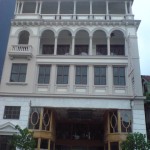

Patrizia Pinzon: Yes, we do speak English to each other but he speaks Spanish.
Jet Metier: Because why? Is he Cuban?
Patrizia Pinzon: No, no, no. He is full on Miami; all Miami. Full American. I guess a dying breed of All American Miami. One of the few. But he speaks Spanish. I guess he learned it in his high school.
Patrizia Pinzon: No, no, no. He is full on Miami; all Miami. Full American. I guess a dying breed of All American Miami. One of the few. But he speaks Spanish. I guess he learned it in his high school.
It really came in handy for both of us. He ended up with an accent that was really weird.
Jet Metier: So, when you got married, was it an understanding that he would live in Panama or did you ever consider going back to Miami?
Patrizia Pinzon: The States are awesome and I love going there for experiences, but I don’t know if I could live there.
Patrizia Pinzon: The States are awesome and I love going there for experiences, but I don’t know if I could live there.
Jet Metier: Yes, that is understandable. Is he a Panamanian citizen now or is he an American citizen still? (Canal House apartments, pictured at right.)
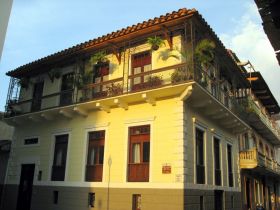
Patrizia Pinzon: Well, he wears guayabera, the traditional white, pleated shirt of Panama. He’s a Casconian. [Editor’s note: From Casco Viejo.]

Patrizia Pinzon: Well, he wears guayabera, the traditional white, pleated shirt of Panama. He’s a Casconian. [Editor’s note: From Casco Viejo.]
Jet Metier: Very special. Now tell me about the fashion happening. You are a supporter of things that are made in Panama, and it’s very interesting.
Patrizia Pinzon: That was my pledge for 2014 and continues in 2015, to try every day to wear something either bought in Casco or made in Casco.
Jet Metier: So how did it go in 2014?
Patrizia Pinzon: Very good. I’m expanding my closet.
Patrizia Pinzon: Very good. I’m expanding my closet.
(Patrizia in clothes all sourced in Casco Viejo, pictured below.)
Jet Metier: Were you able to buy shoes that were made in Casco?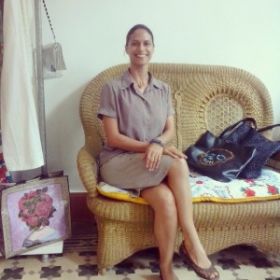
Patrizia Pinzon: Shoes will be the next frontier.
Jet Metier: So it was basically cloth items. What about purses?
Patrizia Pinzon: Purses, I have plenty. On a related subject, I’m going to a meeting later and I will tell you what the meeting is about just for you to have fun. We are organizing a children’s carnival, with vintage, old, classic games. It will be the whole area here in Calle Dose. There are about 10 of us who are organizing the carnival to give something to the kids.

Patrizia Pinzon: Shoes will be the next frontier.
Jet Metier: So it was basically cloth items. What about purses?
Patrizia Pinzon: Purses, I have plenty. On a related subject, I’m going to a meeting later and I will tell you what the meeting is about just for you to have fun. We are organizing a children’s carnival, with vintage, old, classic games. It will be the whole area here in Calle Dose. There are about 10 of us who are organizing the carnival to give something to the kids.
Jet Metier: That sounds wonderful. I know you have to get to that meeting, so thank you for this interview. Can I use the pictures from your your Arco Properties blog, Patrizia?
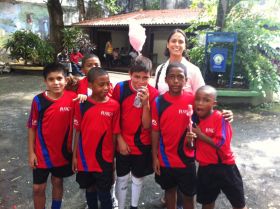
Patrizia Pinzon: Yes, go ahead.
Jet Metier: I’m so glad that we got to talk. We’ll talk again. Thank you, Patrizia, and have a wonderful meeting.
Patrizia Pinzon: It’s been a pleasure. Thank you, Jet, so much.
((Patrizia with local soccer players.)


